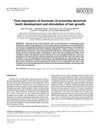TLDR Thymosin β4 helps improve skin healing and reduce scarring.
The document from January 1, 2016, detailed the beneficial effects of Thymosin β4 (Tβ4) in promoting dermal healing. Tβ4, a regenerative protein, was found to have angiogenic and anti-inflammatory properties and played a significant role in wound healing by reducing inflammation, promoting cell migration, angiogenesis, and stem cell recruitment. It was shown to improve healing rates in various animal models, including those with diabetes and aging, and in human clinical trials involving patients with pressure ulcers, venous stasis ulcers, and epidermolysis bullosa wounds. The trials, which included a phase 1 safety trial with 15 volunteers and phase 2 trials with a total of 172 patients, indicated that Tβ4 was safe and well-tolerated, with a trend toward faster healing at certain concentrations. The document concluded that Tβ4 has potential as a therapeutic agent for enhancing dermal healing and reducing scarring, and that more clinical studies are needed to define its efficacy and optimal dosing.
15 citations
,
June 2015 in “PLoS ONE” Thymosin beta-4 promotes hair growth in mice.
 68 citations
,
December 2014 in “Cell Biochemistry and Function”
68 citations
,
December 2014 in “Cell Biochemistry and Function” Nuclear hormone receptors play a significant role in skin wound healing and could lead to better treatment methods.
 34 citations
,
December 2009 in “The International Journal of Developmental Biology”
34 citations
,
December 2009 in “The International Journal of Developmental Biology” Too much thymosin beta4 causes weird teeth and more hair growth in mice.
 98 citations
,
December 2003 in “The FASEB Journal”
98 citations
,
December 2003 in “The FASEB Journal” Thymosin β4 promotes hair growth by activating stem cells in hair follicles.
13 citations
,
January 2021 in “Journal of Cellular and Molecular Medicine” Thymosin β4 may boost hair growth by aiding stem cell movement and blood vessel formation.
12 citations
,
December 2022 in “Current Protein and Peptide Science” Thymosin β4 helps in cell activities, healing, and organ preservation, and treats hair loss and skin injuries.
37 citations
,
February 2024 in “Military Medical Research” Biomaterials can help heal wounds without scars and regenerate skin features.
 January 2024 in “Inflammation and regeneration”
January 2024 in “Inflammation and regeneration” Th22 cells are essential for Tβ15-induced hair growth in mice.
29 citations
,
December 2021 in “Pharmaceutics” Phospholipid soft vesicles improve topical drug delivery for better skin condition treatments.




